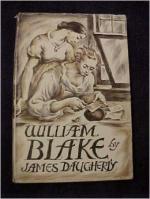|
This section contains 2,977 words (approx. 10 pages at 300 words per page) |

|
SOURCE: "Lyrical Poems," in William Blake: A Critical Essay, revised edition, Chatto & Windus, 1906, pp. 123-38.
A nineteenth-century English poet, dramatist, and critic, Swinburne was renowned during his lifetime for his skill and technical mastery as a lyric poet and is currently regarded as a preeminent symbol of rebellion against the prevailing moral orientation of Victorian aesthetics. Blake scholars also recognize his contribution as the author of the first full-length critical study of the poet, William Blake: A Critical Essay, which was first published in 1868. In the following excerpt, taken from the 1906 edition of that book, Swinburne admires the poignancy of the poems in Songs of Innocence but finds the pieces in Songs of Experience more profound.
[The Songs of Innocence and of Experience] at a first naming recall only that incomparable charm of form in which they first came out clothed, and hence vex the souls of men...
|
This section contains 2,977 words (approx. 10 pages at 300 words per page) |

|


